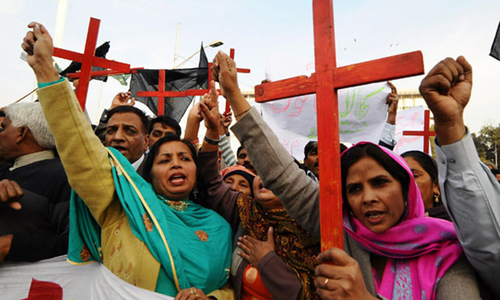THE acquittal of Shafqat Emmanuel and Shagufta by the Lahore High Court this week has once again underscored the deeply problematic and growing misuse of the blasphemy law. After spending seven years in jail, following the handing down of a death sentence to them by an additional district and sessions judge, the Christian couple has been acquitted of charges of sending a blasphemous text message to the complainant, a shopkeeper identified in some news reports as a mosque cleric.
Like many others before them, the couple spent nearly a decade locked away from their families, deprived of their freedom. At the time of her arrest, Shagufta worked as a helper at a school and earned a paltry Rs3,500 a month. Her husband, Shafqat, who is reportedly handicapped, owned a mobile repair shop. The couple from Gojra in Toba Tek Singh come from a very humble background, and one can only imagine how their four children must have fared during their prolonged incarceration.
Sadly, this story is not unique; others too have been falsely accused, languishing for years in jail, only to be acquitted by the higher courts. Asiya Bibi spent almost a decade in solitary confinement before the Supreme Court overturned her death sentence. At the moment, there are several individuals convicted of blasphemy by the lower courts, and awaiting justice from the higher courts.
Read | Footprints: Text message of death
The Supreme Court has often warned against false blasphemy accusations and even called on politicians to ensure that those jailed under these offences have not been wrongly accused. Yet, little progress has been made on this issue and citizens continue to spend too many years of their life awaiting justice.
Parliament must gather the courage to talk about these issues. Lawmakers must also confront how false accusations strip accused citizens of their freedoms with no redress. Moreover, in many chilling cases, an accusation of blasphemy alone — with no evidence or formal legal process — can result in violence and death. The cases of university student Mashal Khan and Christian couple Shama and Shahzad are just two examples of how such accusations lead ignorant people to take the law into their own hands. Salmaan Taseer, despite being a serving governor, too, was killed as a result of the same mentality, which prizes hate and violence over truth and justice. This trend must come to an end, and our lawmakers must unite to find a solution so that more innocent citizens do not suffer.
Published in Dawn, June 5th, 2021













































